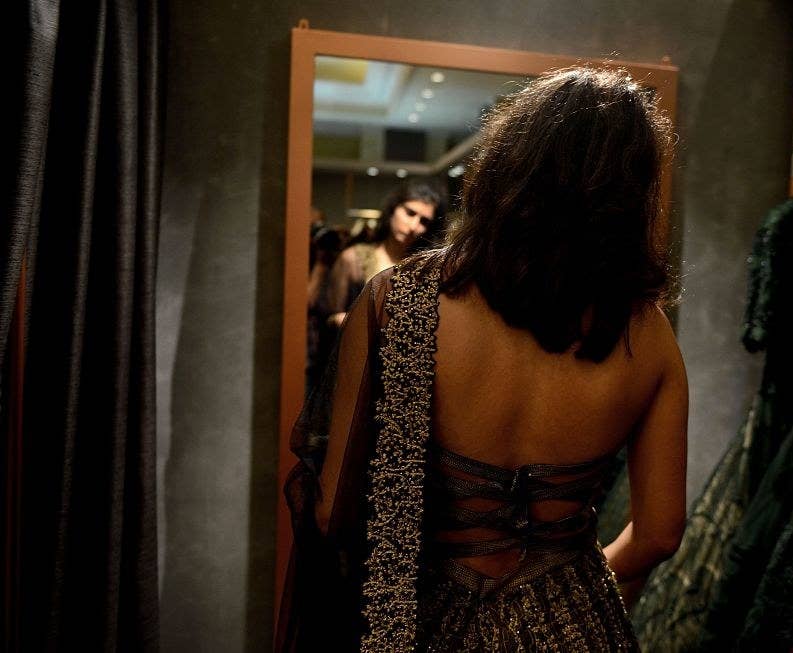
Since you’ve got internet access, you undoubtedly know by now: the principal of Mumbai’s Government Polytechnic College has gone on record to say that, “When (girls) dress like men, they start thinking or behaving like them. There is a gender role reversal in their head. Due to this, the natural urge to reproduce diminishes right from a young age and therefore they suffer from problems like PCODs.”
I’ve got used to being at the receiving end of fucked up diktats.
Well. It’s a theory, albeit a pretty fucked up, baseless one. But its inherent flaws don’t surprise me.
By now, I’ve got used to being at the receiving end of a fucked up diktats delivered via unqualified authority figures.
Here’s a depressing sampler – don’t use mobile phones, call your rapist “brother”, stop wearing jeans …, and so on and so forth.
Thankfully, her instruction was unreasonable enough that, as I write this, thousands of men and women are calling her out. #DressLikeAnIndianWoman has trended all day today – a show of solidarity for women, by women.
(As a beautiful consequence of a fucked up world, women have gotten quick and good at standing up for ourselves and each other. It’s heartening and it’s necessary.)
#DressLikeAnIndianWoman has trended all day.
But today’s affront against women stands out because it doesn’t come via a khap panchayat leader or right-wing protector of Indian culture, nor by a man looking for print space courtesy of outrage.
This time, we’ve got a woman telling other women what women should do to be good women.
We’ve got a woman telling other women what women should do to be good women.
And, while she did it from a position of authority and in an interview with the press, it isn’t a brand new phenomenon.
Yup, women encourage and support each other. And yes, we march against injustice and oppression. Indeed, we raise our voices when it’s necessary.
Of course we do, and thank god we do.
But prolonged conditioning is a funny thing. It has a way of seeping in and hiding in dark corners inside you, sitting there for so long that it becomes part of the furniture.
You barely notice it when you point out to a girlfriend, kindly of course, that she’s overdue for upper lip threading. You think you’re doing a favour when really what you’re saying is: “You're overdue to go spend money and undergo physical pain in order to meet societal expectations of your gender!”
We’ve been oppressed and policed for so long, we’ve become agents of our own oppression.
You don’t notice it when you whisper to a stranger in a bar that her bra strap is showing, even though what you’re really doing is enforcing an expectation of modesty that you were taught and she was taught and which neither of you have questioned since.
You don’t notice, when you tell a friend that a certain dress “makes her look thin,” that you’re enforcing body and beauty standards that are dumb to begin with.
We don’t notice so many judgments and habits, deployed casually and often benevolently, all seeped in ideas we didn’t want in the first place but grew used to.
Even as we rail against Swati Deshpande for prescribing “good” womanhood, we do the same to one another with ease when we proclaim, “She sleeps around!” and “She drinks so much!” and “What are you wearing, you look like a man!”
We’ve been oppressed and policed for so long, we’ve become agents of our own oppression. We police each other, even though the world is policing us all the time anyway.
We police each other.
As so many of us must have, I’ve been at the receiving end too. So much so that it’s become my personality type –– I like oversized shirts and faded jeans, feel most comfortable with my hair tied back, and don’t have an affinity for makeup. But that combination of preferences makes me the “non-girly” girl, a label I’ve accepted for myself.
But by calling myself “non-girly,” I implicitly proclaim that the defining features of girlhood are form-fitting clothes and lipstick.
Even as I say I’m not the conventional “girl,” I’m insisting that such a thing exists.
I remember a time before my habits calcified, when my friends would, with all the kindness of well-meaning, wiser women, pick out my outfits for dates.
By saying I’m not the conventional “girl,” I’m insisting that such a thing exists.
It wasn’t insidious, it was real goodwill.
They were teaching me what they knew about how women are supposed to look, what we should wear, what we should do to be more “ladylike”, less “slutty”, more “feminine”.
While pop culture and magazines and families set the definitions of womanhood for us, we grow up reinforcing those ideas to each other, over and over again.
We may not go on record, like Swati Deshpande, to say that the purpose of a woman’s life is to reproduce. But we do worry about our single and unmarried and childless friends, lending unsolicited advice about how to “fix” their singlehood, unaware of the code of conduct of womanhood that we’re perpetuating.
So while we call her out, let’s remember to call ourselves out too, when we slip into making her mistake.
Let’s not set rules for “womanhood”.
Let’s not believe there’s an aesthetic that accompanies our gender. Let’s not set rules for “womanhood”. Let’s not teach each other how to be “ladylike”. And let’s not believe or insist that there’s a correct way to be a girl.
While we tell Swati Deshpande to back the fuck off, let’s also leave each other alone. It’s bad enough when magazines and men tell us what to do. It’s much worse when we take the leash controlling us and hold it in our own mouth.

